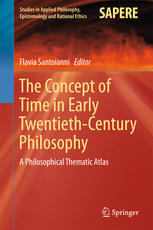

Most ebook files are in PDF format, so you can easily read them using various software such as Foxit Reader or directly on the Google Chrome browser.
Some ebook files are released by publishers in other formats such as .awz, .mobi, .epub, .fb2, etc. You may need to install specific software to read these formats on mobile/PC, such as Calibre.
Please read the tutorial at this link: https://ebookbell.com/faq
We offer FREE conversion to the popular formats you request; however, this may take some time. Therefore, right after payment, please email us, and we will try to provide the service as quickly as possible.
For some exceptional file formats or broken links (if any), please refrain from opening any disputes. Instead, email us first, and we will try to assist within a maximum of 6 hours.
EbookBell Team

5.0
38 reviewsThis book presents a collection of authoritative contributions on the concept of time in early twentieth-century philosophy. It is structured in the form of a thematic atlas: each section is accompanied by relevant elementary logic maps that reproduce in a “spatial” form the directionalities (arguments and/or discourses) reported on in the text. The book is divided into three main sections, the first of which covers phenomenology and the perception of time by analyzing the works of Bergson, Husserl, Sartre, Merleau-Ponty, Deleuze, Guattari and Derrida. The second section focuses on the language and conceptualization of time, examining the works of Cassirer, Wittgenstein, Heidegger, Lacan, Ricoeur and Foucault, while the last section addresses the science and logic of time as they appear in the works of Guillaume, Einstein, Reichenbach, Prigogine and Barbour. The purpose of the book is threefold: to provide readers with a comprehensive overview of the concept of time in early twentieth-century philosophy; to show how conceptual reasoning can be supported by accompanying linguistic and spatial representations; and to stimulate novel research in the humanistic field concerning the complex role of graphic representations in the comprehension of concepts.